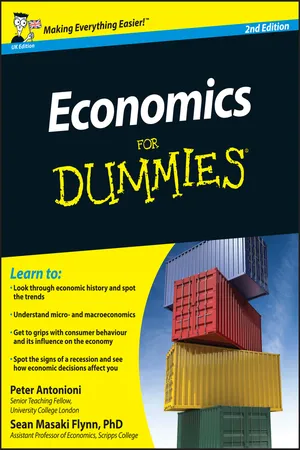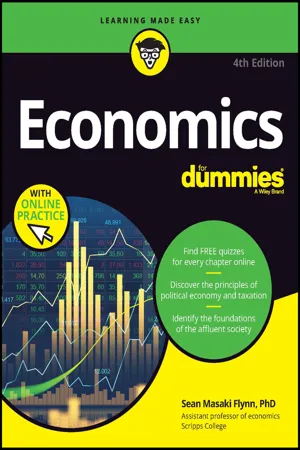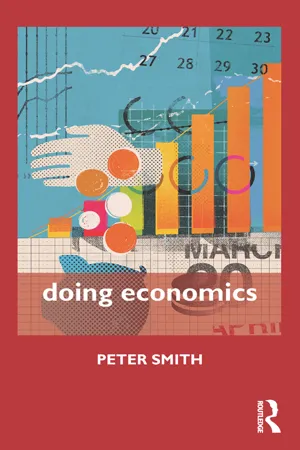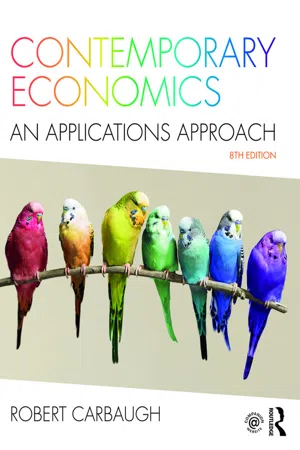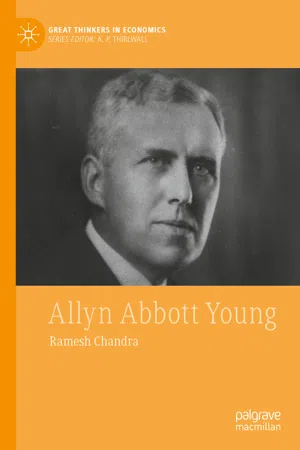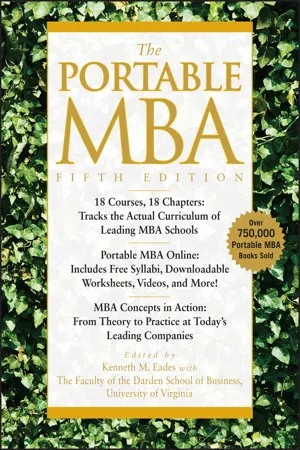Economics
Scope of Economics
The scope of economics refers to the range of economic activities and phenomena that the discipline encompasses. It includes the study of production, distribution, and consumption of goods and services, as well as the analysis of how individuals, businesses, and governments make decisions to allocate resources. Additionally, the scope of economics extends to examining the impact of policies and external factors on economic systems.
Written by Perlego with AI-assistance
Related key terms
7 Key excerpts on "Scope of Economics"
- eBook - ePub
- Cynthia Metcalf, Rhonda Atkinson(Authors)
- 2017(Publication Date)
- Research & Education Association(Publisher)
Most contemporary definitions of economics involve the notions of choice and scarcity and their relationship to one another. Perhaps the earliest of these is by Lionel Robbins in 1935: “Economics is a science which studies human behavior as a relationship between ends and scarce means which have alternative uses.” Virtually all textbooks have definitions that are derived from this definition, though the exact wording differs from author to author.The standard definition of economics is something like this: “Economics is the social science that examines how people choose to use limited or scarce resources to obtain maximum satisfaction of unlimited wants.”Macroeconomics is the study of the economy as a whole and includes topics such as inflation, unemployment, and economic growth. Microeconomics is the study of the individual parts (e.g., households, business firms, and government agencies) that make up the economy. It particularly emphasizes both how these units make decisions and the consequences of these decisions.COMPETENCY 2.1Analyze how scarcity and opportunity cost influence choices about how to allocate resources.Economists believe that human wants are unlimited while the resources to satisfy those needs are limited. Consequently, society is never able to produce enough goods and services to satisfy everybody, or almost anyone, completely. Alternatively, resources are scarce relative to human needs and desires. When resources are limited, the limitation affects prices (the amount of money needed to buy goods, services, or resources). Scarcity - eBook - ePub
- Peter Antonioni, Sean Masaki Flynn(Authors)
- 2010(Publication Date)
- For Dummies(Publisher)
Part I Economics: The Science of How People Deal with ScarcityIn this part . . .Economics studies how people deal with scarcity and the inescapable fact that our wants typically exceed the means available to satisfy them. The fact that life has limits may not at first seem like a good basis for an entire social science, but every government decision, every business decision and a large chunk of your personal decisions all come down to deciding how to get the most out of limited resources. Consequently, as we explain in this part, economics is fundamental to almost all aspects of life.Passage contains an image
Chapter 1 What Does Economics Study? And Why Should You Care? In This Chapter Taking a quick peek at economic history Observing how people cope with scarcity Separating macroeconomics and microeconomics Growing the economy and avoiding recessions Understanding individual and firm behaviour Getting a grip on the graphs and models that economists love to useEconomics is the science that studies how people and societies make decisions that allow them to get the most out of their limited resources. Because every country, every business and every person deals with constraints and limitations, economics is literally everywhere.For example, you could be doing something else right now instead of reading this book: exercising, watching a film or talking with a friend. The only reason for you to be reading this book is that doing so is the best possible use of your very limited time.In the same way, you hope that the paper and ink used to make this book have been put to their very best use. Similarly, we all hope that every last tax pound that the government spends is being used in the best possible way, and not being dissipated on projects of secondary importance. - eBook - ePub
Economics For Dummies
Book + Chapter Quizzes Online
- Sean Masaki Flynn(Author)
- 2023(Publication Date)
- For Dummies(Publisher)
Part 1Economics: The Science of How People Deal with Scarcity
IN THIS PART …- Find out what economics is, what economists do, and why these things are important.
- Decipher how people decide what brings them the most happiness.
- Understand how goods and services are produced, how resources are allocated, and the roles of government and the market.
Passage contains an image Chapter 1
What Economics Is and Why You Should Care
IN THIS CHAPTERTaking a quick peek at economic historyObserving how people cope with scarcitySeparating macroeconomics from microeconomicsGetting a grip on economic graphs and modelsEconomics studies how people and societies make decisions that allow them to get the most from their limited resources. And because every country, every business, and every person has to deal with constraints, economics is everywhere. At this very moment, for example, you could be doing something other than reading this book. You could be grueling through your hundredth pushup, bingeing the hottest series on Netflix, or texting with that friend you reconnected with at your last reunion. You should only be reading this book if doing so is the best possible use of your limited time. In the same way, you should hope that the resources used to create this book have been put to their best use and that every dollar your government spends is being managed in the best possible way.Economics gets to the heart of these issues by analyzing the behavior of individuals, firms, governments, and other social and political institutions to see how well they convert humanity’s limited resources into the goods and services that would best satisfy needs and wants.Considering a Little Economic History
To better understand today’s economic situation and what sorts of changes might promote the most significant improvements in economic efficiency, you have to look back on economic history to see how humanity got to where it is now. Please stick with me. I’ll make this discussion as efficient and painless as possible. - eBook - ePub
- Peter Smith(Author)
- 2016(Publication Date)
- Routledge(Publisher)
PART IIThe Scope of Economics
Passage contains an image
3
Micro and macroperspectives
This chapter will:
• highlight the distinction between microeconomics and macroeconomics• introduce the demand and supply model and the key notion of equilibrium• explain how the model enables analysis of how markets adjust to changes in market conditions• discuss how markets may fail to produce a good outcome for society• note that there may be situations in which economic agents may not act rationally• introduce key aspects of macroeconomic thinking• identify macroeconomic policy objectives and instrumentsChapter 2 discussed how economics developed as a subject, initially mainly focusing on decisions made by individual economic agents until Keynes drew attention to the need to consider how the economy as a whole operates.This highlights a distinction between macroeconomics (the study of interactions between economic variables at the aggregate level) and microeconomics (the study of the economic behaviour of individual economic agents). This distinction remains in many (if not most) university degree programmes, although it is recognised that there are common approaches and ways of thinking used in both, and that much macroeconomic analysis builds upon microeconomic principles.Although this book is not intended to be a textbook, this chapter introduces some of the key terms and concepts used in both microeconomics and macroeconomics, and how these are analysed by economists. This should give you a flavour of what to expect on your degree programme. We begin with microeconomics.Microeconomics
The focus of microeconomics is on studying the economic behaviour of individual economic agents, and how this shapes decision-making. Initially, we will consider decisions taken by consumers (who buy goods and services) and firms (which supply goods and services). This takes us to what is probably the most famous of all models in economics – the demand and supply model. This will be used to introduce the way in which economists work. - Available until 20 Jul |Learn more
Contemporary Economics
An Applications Approach
- Robert Carbaugh(Author)
- 2016(Publication Date)
- Routledge(Publisher)
Macroeconomics is concerned with the overall performance of the economy. Macroeconomics does not focus on the activities of individual households, firms, or markets; instead, it focuses on the behavior of the economy itself. It deals especially with the determination of total output, the level of employment, and the price level.We study macroeconomics to learn how the overall economy works and to understand the controversies concerning economic policies. Among the macroeconomic topics that we will examine are the following:- Why do some economies grow more rapidly than others?
- What causes unemployment and inflation?
- Should the government adopt policies to increase savings and investment?
- Should the government limit the outsourcing of American jobs to foreign nations?
- How does a decrease in interest rates affect the economy?
The Economic Way of Thinking
The practice of economics often calls for an analysis of complex problems. Although economists may differ in their ideological views, they have developed an “economic way of thinking.” This methodology is based on several principles.Every Choice Has a Cost
Because human and property resources are scarce, individuals and societies must choose how best to use them. Making prudent choices requires trading off one thing for another. At the core of economics is the notion that “there is no such thing as a free lunch.” A friend may buy your lunch, making it “free” to you, but there still is a cost to someone and, ultimately, to society. This notion expresses the fundamental principle of economics: Every choice involves a cost.The cost of any choice is the value of the best opportunity that is forgone in making it. For example, you can choose to remain in college or quit college. If you quit, you may find a job at Burger King and earn enough money to buy some Levi’s jeans, rent some videos, go golfing and skiing, and hang out with your friends. If you remain in college, you will not currently be able to afford all of these things now. However, your education will enable you to find a better job later, and then you will be able to afford these and many other items. - eBook - ePub
- Ramesh Chandra(Author)
- 2019(Publication Date)
- Palgrave Macmillan(Publisher)
values , his ends, lie within the connected whole” (ibid., p. 4).Since economics is one of the social sciences, some writers regard it as a part of sociology, the general science of society (Ely et al. 1930 , p. 9). Economists generally refrain from expressing ethical or moral judgements. Economists analyse economic aspects of practical problems and the final judgement depends on a synthesis of moral, political, economic and other considerations. Moreover: “Above economic man stands the political man, free to limit and define the field of economic man’s activity, to impose conditions upon him, to prevent him from doing certain things, to encourage him to do others ” (Young 1927a ; Mehrling and Sandilands 1999 , p. 4).Since economics deals with man as he actually is, and not with an artificially constructed economic man, it cannot be completely divorced from ethics and politics. For example, in setting of fair and reasonable railway rates, apportionment of taxes, restrictive regulations and sumptuary laws, economic questions get interwoven with ethical, legal and political considerations. Although economics does not undertake a systematic study of law, ethics and politics, its conclusions may almost always be supplemented by non-economic factors which an economist may not have fully taken into account.Young viewed economic relations as a part of larger social picture (Mehrling and Sandilands 1999 , p. xiv). Economics is just one of the social sciences, and the final terms of economic inferences reach out to other systems of relations often non-economic in character. It is from these other relations that final terms of economics get their meaning and significance. Thus, if economics is to remain practically useful, these final terms need to be handled very carefully.Every social science is defined in terms of its problems but has its own orientation, scope and viewpoint (Young 1927a ; Mehrling and Sandilands 1999 - eBook - ePub
- Kenneth M. Eades, Timothy M. Laseter, Ian Skurnik, Peter L. Rodriguez, Lynn A. Isabella, Paul J. Simko(Authors)
- 2010(Publication Date)
- Wiley(Publisher)
The Wealth of Nations, published in 1776. Resource allocation is determined in a market system by reactions to and changes in prices. While the mechanics are rather simple, the implications for society and the belief that firms and markets are valuable social institutions rest in large part on the ideas embodied in supply and demand analysis.A Shift in SupplyExhibit 2.3It is not from the benevolence of the butcher, the brewer or the baker that we expect our dinner, but from their regard to their own self interest…. [Every individual] intends only his own security, only his own gain. And he is in this led by an invisible hand to promote an end which was no part of his original intention. By pursuing his own interest, he frequently promotes that of society more effectually than when he really intends to promote it.—Adam SmithMacroeconomics
Whereas microeconomics focuses on individual and firm-level decisions, macroeconomics focuses on the broad state of the economy. When people ask, “What’s the economy doing?” or “What’s the state of the stock market?” they are asking about the macroeconomy. Macroeconomics employs tools and concepts that help us to think about and predict the level of unemployment, the rate of inflation, rates of economic growth, the level of interest rates, and the policies governments pursue to influence them. Because ultimately the impact of policies depends on the behavior of individuals and firms, macroeconomics does not ignore microeconomic analysis. Models of macroeconomic behavior are rooted in ideas and evidence of how individuals react to changes in their environment. Macroeconomic models range from the simple to the incredibly complex, and all embody some key relationships that we discuss in the remainder of this chapter.To begin with, we can represent what goes on in the economy with a supply and demand graph very similar to those used in the microeconomics section. Exhibit 2.4 is such a graph. Notice that we have appended an A to the D and S to note that we are now dealing with aggregate demand (AD) and aggregate supply (AS). By aggregate, we mean the value of all of the goods and services produced in the economy during a period of time. The more common phrase for this value is the gross domestic product (GDP) of the economy. Since the AD
Learn about this page
Index pages curate the most relevant extracts from our library of academic textbooks. They’ve been created using an in-house natural language model (NLM), each adding context and meaning to key research topics.

